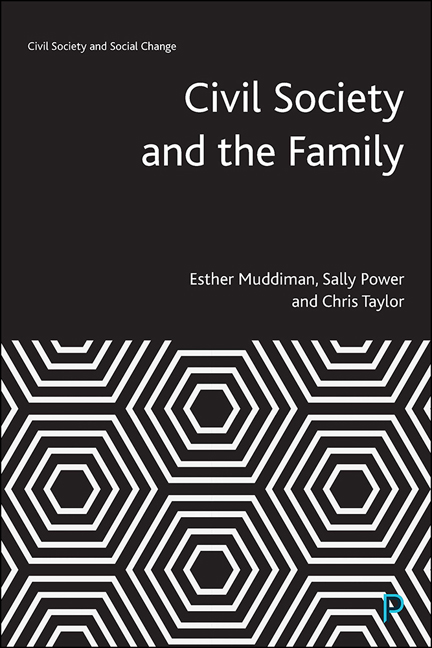Book contents
- Frontmatter
- Contents
- Tables
- Figures
- Notes on the Authors
- Acknowledgements
- 1 Starting Points
- 2 The Paradoxical Positioning of the Family and Civil Society
- 3 The Challenges of Researching the ‘Private Sphere’ of the Family
- 4 The Uncertain Business of Raising Citizens
- 5 Keeping the Faith? Secularisation, the Family and Civic Engagement
- 6 Mothers, Grandmothers and Civic Engagement
- 7 Family Arguments: Finding one’s Voice
- 8 Politicising Family Food Practices
- 9 The Upward Transmission of Civic ‘Virtues’
- 10 Reframing Civil Society and the Family
- References
- Index
3 - The Challenges of Researching the ‘Private Sphere’ of the Family
Published online by Cambridge University Press: 18 March 2021
- Frontmatter
- Contents
- Tables
- Figures
- Notes on the Authors
- Acknowledgements
- 1 Starting Points
- 2 The Paradoxical Positioning of the Family and Civil Society
- 3 The Challenges of Researching the ‘Private Sphere’ of the Family
- 4 The Uncertain Business of Raising Citizens
- 5 Keeping the Faith? Secularisation, the Family and Civic Engagement
- 6 Mothers, Grandmothers and Civic Engagement
- 7 Family Arguments: Finding one’s Voice
- 8 Politicising Family Food Practices
- 9 The Upward Transmission of Civic ‘Virtues’
- 10 Reframing Civil Society and the Family
- References
- Index
Summary
Introduction
This chapter builds on the theoretical foundations laid in Chapter 2 to consider the challenges of, and opportunities afforded by, undertaking research with families. The home is normally regarded as an intensely private place, and it is rare for a non-family member to be given insights into family practices, allegiances and ruptures. We begin by considering these challenges and opportunities with reference to other scholars who have sought to understand the dynamics of private family life. This is followed by a description of our own mixed-methods approach, which combines a multigenerational questionnaire with numerous conversations with parents and grandparents, as well as a family tree mapping exercise. We discusses how we combined these methods to explore the extent to which the ‘relational, embedded and connected’ nature of everyday life (Mason, 2004) contributes to the inheritance or abandonment of particular forms of civic engagement.
We then introduce our participants, both those who completed our intergenerational survey and the subset of 20 families who we interviewed. Although predominantly white, our families vary significantly in terms of their household make-up and socioeconomic circumstances. We reflect on the research process, drawing on interview data to discuss how parents and grandparents described and commented on their experiences. The chapter concludes with some caveats that should help readers to contextualise and interpret the empirical research presented in the following chapters.
How might the family home be linked to social change?
Studies on social change, or world making, often focus on overarching systems and institutions rather than kinship bonds (Jamieson, 2016). However, some schools of thought, including phenomenology, symbolic interactionism and feminist Marxism, to name a few, shine a light on the potential for family and kinship relationships to play their part in world making. Therefore, while home life and family activities have historically been regarded as private and distinct from ‘mainstream’ activities in contemporary society (such as paid employment and politics), following Allen and Crow (1989: 5), we argue that ‘the public world does not begin and end at the front door’. Indeed, notwithstanding the methodological and ethical challenges of penetrating family life, the home ‘deserves to be treated as a central part of contemporary society’ (Allen and Crow, 1989: 1).
- Type
- Chapter
- Information
- Civil Society and the Family , pp. 25 - 46Publisher: Bristol University PressPrint publication year: 2020



